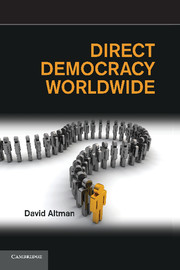Book contents
- Frontmatter
- Contents
- Tables
- Figures
- Preface and Acknowledgments
- Abbreviations
- 1 Direct Democracy at the Turn of the Century
- 2 Terms of the Debate Surrounding Direct Democracy
- 3 Myths and Facts behind the Use of Mechanisms of Direct Democracy
- 4 Direct Democracy within Nondemocratic Regimes
- 5 Direct Democracy within Weak Democracies
- 6 Direct Democracy within Democracies
- 7 Uruguayan Citizen-Initiated Mechanisms of Direct Democracy as Agents of Vertical Accountability
- 8 Conclusions
- Appendix
- References
- Index
Preface and Acknowledgments
Published online by Cambridge University Press: 01 March 2011
- Frontmatter
- Contents
- Tables
- Figures
- Preface and Acknowledgments
- Abbreviations
- 1 Direct Democracy at the Turn of the Century
- 2 Terms of the Debate Surrounding Direct Democracy
- 3 Myths and Facts behind the Use of Mechanisms of Direct Democracy
- 4 Direct Democracy within Nondemocratic Regimes
- 5 Direct Democracy within Weak Democracies
- 6 Direct Democracy within Democracies
- 7 Uruguayan Citizen-Initiated Mechanisms of Direct Democracy as Agents of Vertical Accountability
- 8 Conclusions
- Appendix
- References
- Index
Summary
I remember exactly how I became interested in the study of political science. It was about thirty years ago, during the spring of 1980, in Uruguay, the country where I was born. At that time, Uruguay was under military rule and the military attempted to ratify – via a plebiscite – a new constitution that sought to establish a new order in the country, essentially a militarily protected democracy. A few days before the plebiscite, I asked my father how he was planning to vote. With no knowledge of the political leanings of my schoolmates' parents (and perhaps fearful that they were members of the military regime), he sat me on his lap. Softly and calmly, he told me that he and my mother were voting against the military, but that I could not tell anyone…ANYONE! When I asked why they were voting “no,” he explained that sometimes the “bad guys” govern, and that he and my mother did not want that kind of future for Uruguay. My intuition then pushed me to ask why, if they were the bad guys, they were governing, when of course the good guys should be governing the country. I do not remember what my father told me then, but I do recall the perplexed look on his face. My confusion was later exacerbated in my search for an answer as to why the military accepted their disastrous defeat.
- Type
- Chapter
- Information
- Direct Democracy Worldwide , pp. xi - xivPublisher: Cambridge University PressPrint publication year: 2010



